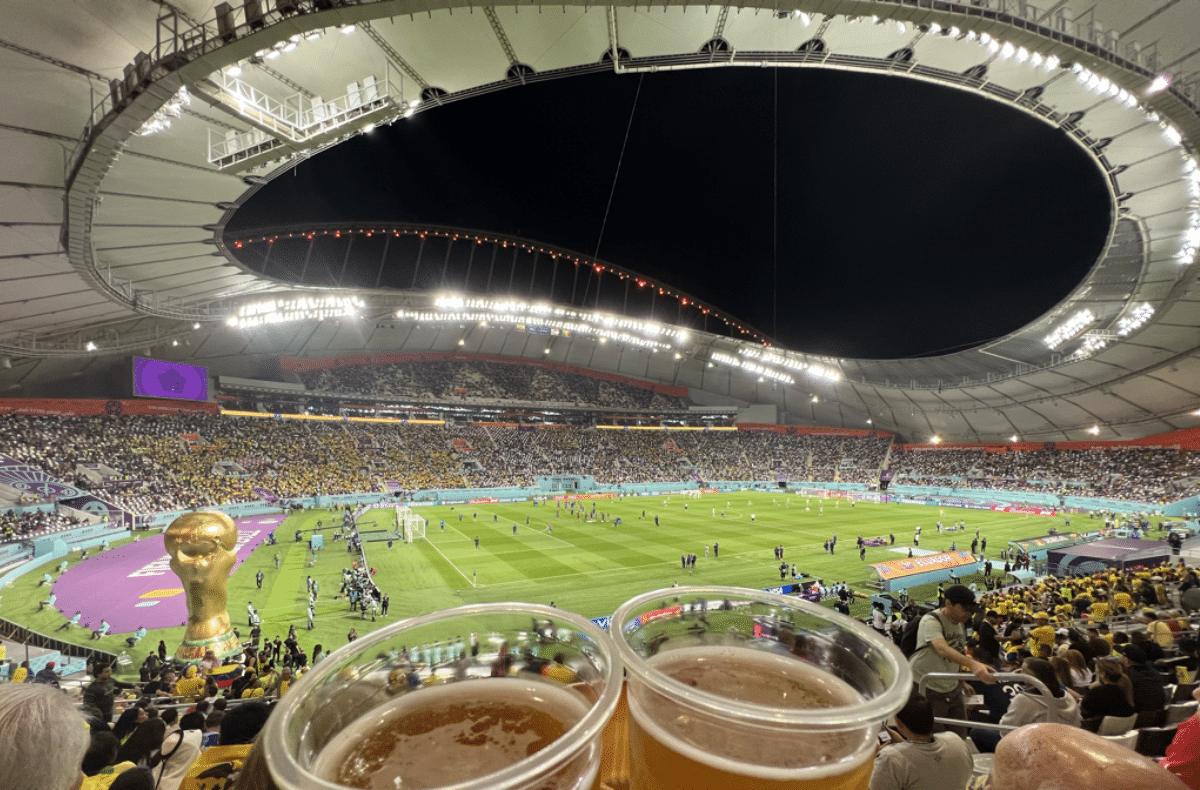
First and foremost, I want to give my condolences to the family of United States sports writer Grant Wahl, who suddenly passed away during the Argentina v. Netherlands match on Friday, December 9th at Lusail Stadium. This unexpected tragedy was jarring, as early medical reports indicate his passing was not due to COVID-19-related illnesses, but he had been diagnosed earlier in the week with a moderate case of bronchitis. Another twist to Wahl’s story is that on November 21st, he was detained by stadium security before the United States national team’s match against Wales at Ahmad Bin Ali stadium for wearing a pro-LGBTQ shirt while he was seeking to enter the stadium to cover the match.
While FIFA officials, Qatari officials, and the US Department of State are working with Wahl’s wife Dr. Celine Grounder on arrangements to transport his body, I am hopeful for a clear and respectful resolution to this matter.
I have been a big fan of Grant Wahl’s work since he covered LeBron James in high school in the Sports Illustrated cover article, in which he proclaimed James as the “chosen one.” I was hoping to cross paths with him during my time in Doha, as his career was an inspiration. Wahl, 48, has covered many sports, but was especially well known for his soccer coverage—and particularly through his book about David Beckham, The Beckham Experiment. Truly, the world will miss his presence as someone who majorly shaped the sports media landscape.
As I continue with this final piece on my experience in Qatar, I write with a saddened heart to have lost such a deeply talented colleague while covering a sporting event that has played such an important role in my career development.
***
Sustainable Air-conditioning in Open-air Stadiums
During my time in Qatar, health and safety protocols were of major concern, as the heat would reach as high as 90 degrees Fahrenheit (32 degrees Celsius) during the day and drop to 60 degrees Fahrenheit (15 degrees Celsius) at night. Traditionally, the heat index would be too hot for a sporting mega event, but air-conditioning in the stadiums helped keep the in-stadium temperature at a much more bearable 72 degrees Fahrenheit (22 degrees Celsius). Sometimes the stadiums would feel colder, as the outside temperature would drop and the stadium’s cooling system would take a while to adjust. I found myself packing a jacket or sweatshirt for the night matches as the weather could turn unexpectedly.
Sustainability was another major aspect of the stadium design of Qatar 2022 stadiums, each of which has achieved at least a 4-star certification from the Global Sustainability Assessment System (GSAS). With the addition of carbon-neutral practices, green spaces, and its updated public transport system, Qatar has set a master-class example for sustainability. During my visit, I was fortunate to run into Orjan Lundberg, one of my former students from the Josoor Institute’s Football and Sport Management program, at Ahmad Bin Ali Stadium (Costa Rica v. Japan Match). Orjan is the Sustainability Senior Manager for the Supreme Committee for the Delivery and Legacy of the Qatar 2022 FIFA World Cup. It is great to know that the fruits of his group’s efforts and their many achievements have paid off, reaching high levels of sustainability standards. It sets a great example of what’s possible when ingenuity, engineering, and oversight are correctly and diligently applied. Hopefully we will continue to see greener standards enforced in sporting events of the future.
Sports Diplomacy and the Qatari Royal Family
Multiple sightings of the Qatari Royals at FIFA World Cup matches have been all the rage during the tournament. Most likely they are in VVIP (Very Very Important People) sections rubbing elbows with celebrities such as legendary footballer David Beckham and the Mayor of New York City, Eric Adams. The Emir’s father, H.H. Hamad bin Khalifa Al Thani, and his wife H.H. Sheika Moza bint Nasser have been sighted at matches for the Qatar national soccer team as well as those featuring teams of other Arabic nations, most notably Morocco’s knockout round win over Spain. Additionally, the Qatari Emir H.H. Tamim bin Hamad Al Thani has made the rounds, and was even seen hosting the royal family from the United Arab Emirates (UAE)—this is a major geo-political resolution, considering the 4-year blockade from 2017-2021.
The sports media during the FIFA World Cup held court with many of the representatives of national soccer teams, holding their feet to the proverbial fire. The Iranian media questioned the US national team members on their support of the American flag despite the country’s Anti-Black sentiment. Let’s just say that it was evident the US Soccer Federation has invested heavily in media training, because the responses by the athletes and coaching staff were consistent with the best stump speeches from the 2022 midterm elections. Additionally, on-field protests and the Moroccan national team raising the Palestian flag after victory all added more intriguing storylines to an already one-of-a-kind experience in Doha.
Qatar at the Intersection of Sports and Geopolitics
Soft power in geopolitics has been a topic of contention, with Qatar leveraging its world-class hospitality to position itself as a serious power player on the global stage. As the Russia/Ukraine war continues, Qatar’s notable stockpile of oil and natural gas reserves has made the country a formidable ally of the United States. The relationship between the two countries is fortified by a US Army base in Qatar, which serves as an embodiment of the strategic and impressive partnership between the two countries. As Qatar asserts its intentions to host the 2036 Olympics, the pressure on the International Olympic Committee (IOC) is buoyed by the remarkable demonstration of efficiency and effectiveness exhibited by Qatar with the FIFA 2022 World Cup. Upcoming competitions with the Asian Games in 2030 will only reinforce the stance that Qatar is here to stay, not only as a global sporting destination, but a geopolitical power player as well.
Bidding Qatar a Final Farewell
Nothing could have prepared me for the experiences I have had over the past six years in Qatar. The country itself is an architectural marvel, where modernity meets with nuances of traditional Arabic culture. The Qatari citizens and residents have a nationalistic pride that embodied the “all hands on deck” mantra toward the success of the 2022 FIFA World Cup. Speaking to locals only makes you want to root for the success of the games and the future of the country as it develops into a global power.
Lastly, for me, my Qatar experience necessitated reaching some personal milestones, which were initially daunting—in particular, driving in an international country. Having visited the country so frequently over the past six years, driving on my own during this visit to the World Cup was an absolute necessity. With so many friends, colleagues, former students, and business associates to see during such a busy time, I needed to be mobile, so renting a car was the smart decision. Interestingly, the country only rents high-line luxury vehicles as self-drive rentals with options from Lexus and Mercedes to Maserati. My choice was the Exeed LX, a new Chinese luxury SUV. I received a brand-new rental with the original stickers and plastic still on the vehicle. This beautiful, gas-efficient car was perfect for navigating the maze-like roads to Stadium 974, which was created out of 974 modular steel containers and will be disassembled and transported to a country in Africa or South America after the games. Knowing that the legacy of the Qatar FIFA World Cup will live on while bringing sociocultural benefits to another country only adds to my appreciation of this life-changing experience. And it’s been my privilege to share it through New Thinking with all of you.



